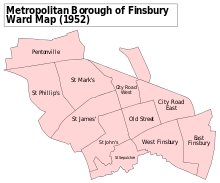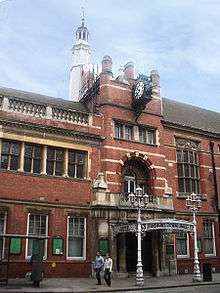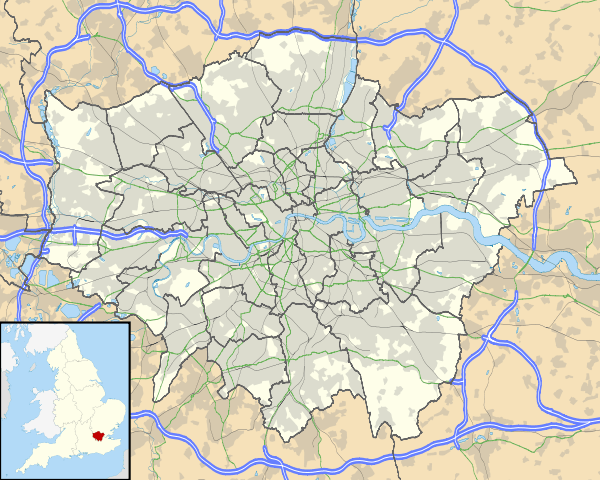Finsbury
Coordinates: 51°31′34″N 0°06′12″W / 51.52603°N 0.10347°W
Finsbury is a district of central London, England. It lies immediately north of the City of London, east and north of Clerkenwell, west of Shoreditch, and south of Islington and City Road. It is in the south of the London Borough of Islington. The Finsbury Estate is in the western part of the district.
Etymology
The name is first recorded as Vinisbir (1231) and means "manor of a man called Finn".[1]
History

In the Middle Ages Finsbury was part of the great fen which lay outside the walls of the City of London.[2] It gave its name to the Finsbury division of the Ossulstone hundred of Middlesex. In the early 17th century trees were planted and gravel walks made, and the area became a place for recreation. In 1641 the Honourable Artillery Company moved to Finsbury, where it still remains, and in 1665 the Bunhill Fields burial ground was opened in the area. The City of London Yeomanry (COLY) also had its headquarters in nearby Finsbury Square when founded at the time of the Second Boer War.
Building on Finsbury Fields began in the late 17th century. The parish church of St Luke's was built in 1732–33, and at the end of the 18th century a residential suburb was built with its centre at Finsbury Square.[2]
In 1832 the parliamentary borough of Finsbury was created, covering a considerably wider area, part of the Finsbury division of Ossulstone hundred. In 1857 a park was opened some three miles north of Finsbury for the enjoyment of the residents of the parliamentary borough, and named Finsbury Park.[1]
The Metropolitan Borough of Finsbury in the County of London was created in 1900, covering the area of Finsbury and Clerkenwell. In 1938, Dr. Chuni Lal Katial was elected mayor of Finsbury, making him the first Asian mayor in the United Kingdom. In 1942 the borough council erected a controversial statue of Vladimir Lenin in Holford Square (now demolished). The borough was abolished in 1965 and absorbed into the borough of Islington.
Famous residents
- George Cruikshank, the Victorian illustrator, lived on Amwell Street
- Violet Kray, mother of the gangster Kray brothers. Twins Ronnie and Reggie were arrested at her flat in Braithwaite House, Finsbury, in connection with gangland crimes including murder and fraud on 8 May 1968.[3]
- Eric Maxon, Shakespearean and early film actor, died in Finsbury
- Arthur Mullard, comic actor
- Dadabhoy Naoroji[4]
Today
The name Finsbury is now most often used of the western part of the district, historically regarded as part of Clerkenwell, which is the home of the former Finsbury Town Hall, Finsbury Estate, Exmouth Market, the Sadler's Wells Theatre, Islington Local History Centre, Islington Museum and City University.
Transport
Nearest places:
Nearest tube stations:
Gallery
 Finsbury Town Hall
Finsbury Town Hall Lubetkin-designed Finsbury Health Centre
Lubetkin-designed Finsbury Health Centre Finsbury War Memorial
Finsbury War Memorial
References
External links
-
 "Finsbury". Encyclopædia Britannica (11th ed.). 1911.
"Finsbury". Encyclopædia Britannica (11th ed.). 1911.

